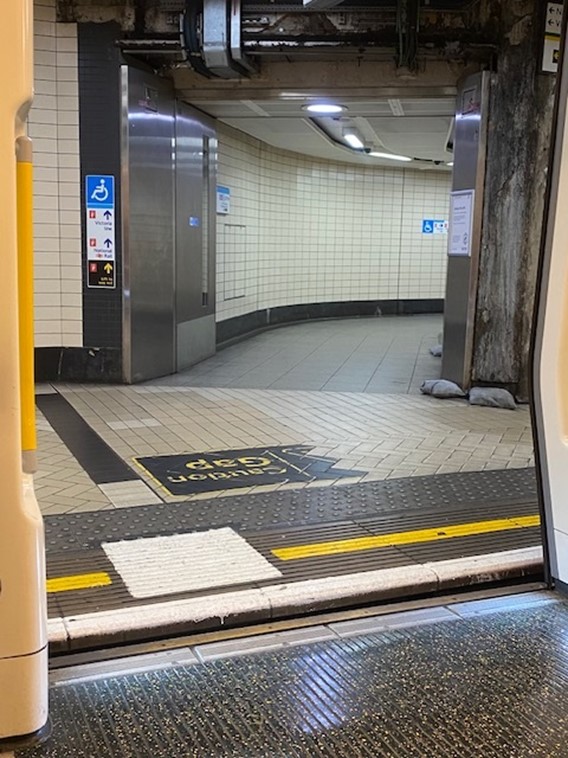Track worker safety
We have continued engagement with LUL in relation to track patrolling, following the Chalfont and Latimer incident, where a track worker was struck and injured by a train.
During the 2023 to 2024 year, LUL changed its working arrangements to significantly reduce the activities which require staff to access the track during the hours when trains are operating.
29 out of 31 track patrols were moved to engineering hours (when trains do not operate) with plans in place to move the remaining two in the near future.
Despite the significant work done by LUL, there have been a substantial number of incidents in the first half of 2023 to 2024 with protection staff accessing the track, not in accordance with the Rule Book, which requires them to witness the last train before accessing the track.
Although there were no injuries, this highlighted the need for improved risk control and we wrote to TfL to obtain assurance on interim actions, whilst further technical solutions are progressed.
Electrical assets
We completed a series of inspections to continue our focus on LUL’s management of electrical assets. These inspections focused on the low voltage (400V and below) distribution systems in station areas. LUL were able to demonstrate how low voltage assets were maintained on both recently installed equipment and assets that were approaching obsolescence. No significant concerns were identified during these inspections.
This work will continue next work year with a focus on smaller stations and will examine how LU manage the risks of low voltage assets located in environmentally challenging areas, for example, those suffering from water ingress, and assess the adequacy of the arrangements in place to maintain safety.
Four lines modernisation
We continued to inspect LUL’s change management approach for the complex four lines modernisation programme (4LM) signalling upgrade of the Circle, District, Hammersmith & City and Metropolitan sub-surface lines. The project is introducing Communication Based Train Control system, which will increase capacity and reliability on the Subsurface lines.
We engaged specialist technical consultants to review a sample of project management arrangements and assist with our evaluation of LUL’s arrangements. This resulted in a number of recommendations. The inspection will continue into the next work year to ensure these recommendations are implemented in the run up to the most complex signalling migration area which is due to be commissioned in early 2025.
Platform Train Interface (PTI)
There continued to be a significant number of trap and drag incidents and falls onto the track with no train in the platform. In 2023 to 2024 there were more than 50 instances where a customer fell from the platform onto the track when a train was absent. These incidents highlight that PTI risk continues to be one of TfL railway operators’ priorities.
For trap and drag incidents, we are assessing LUL’s arrangements for ensuring that train operators are undertaking an accurate check of the PTI after an indication that the doors are closed. Opportunities for improvement remain and TfL are working to improve risk controls to detect the presence of a person on track, incorporating available smart technology using CCTV images, artificial intelligence algorithms and detection models to enable staff to receive notification and insights related to incidents.

Photo: Platform Train Interface on the District Line
Fleet technical and software issues
TfL operators have experienced both technical and software issues. These include spontaneous capacitor failures on the Aventra class 345 and 710 fleets. Following these incidents, we engaged with the relevant TOCs to assess mitigations in place, which included exclusion zones and alternative walking route for those undertaking work near the affect components.
In response to these incidents the train manufacturer has taken the positive step of replacing the capacitors on both fleets. In addition, there have been technical issues with the rolling stock software and more detail can be found in the case study below.
Asset management
We received 8 incident reports relating to asset management failures, including multiple incidents involving wall, ceiling and roof tiles falling, a floor and boundary wall collapse and issues relating to water ingress. Our enquiries revealed areas of incomplete asset information leading to gaps in LUL’s maintenance and management arrangements.
Following these incidents LUL have proposed a general inspection regime over the next 3 years, which will aim to give an improved overarching view of assets, from which ORR can regulate in line with strategic priorities. A proactive inspection on civils asset management is scheduled in the 2024-25 work year to undertake more detailed scrutiny of LUL’s asset management arrangements.
Escalators
We have continued to conduct enquiries into 5 escalator incidents, which have resulted in injury and limbs being drawn into the moving parts of the equipment as well as a number of slips and trips. Following one incident where a child suffered fractured bones, cuts and bruises to their foot at Clapham Common station, enquiries identified no evidence of any health and safety breaches at the time. However this remains a key topic area for TfL, and they are working hard with manufacturers and industry partners to identify ways of eliminating or reducing the risk.

